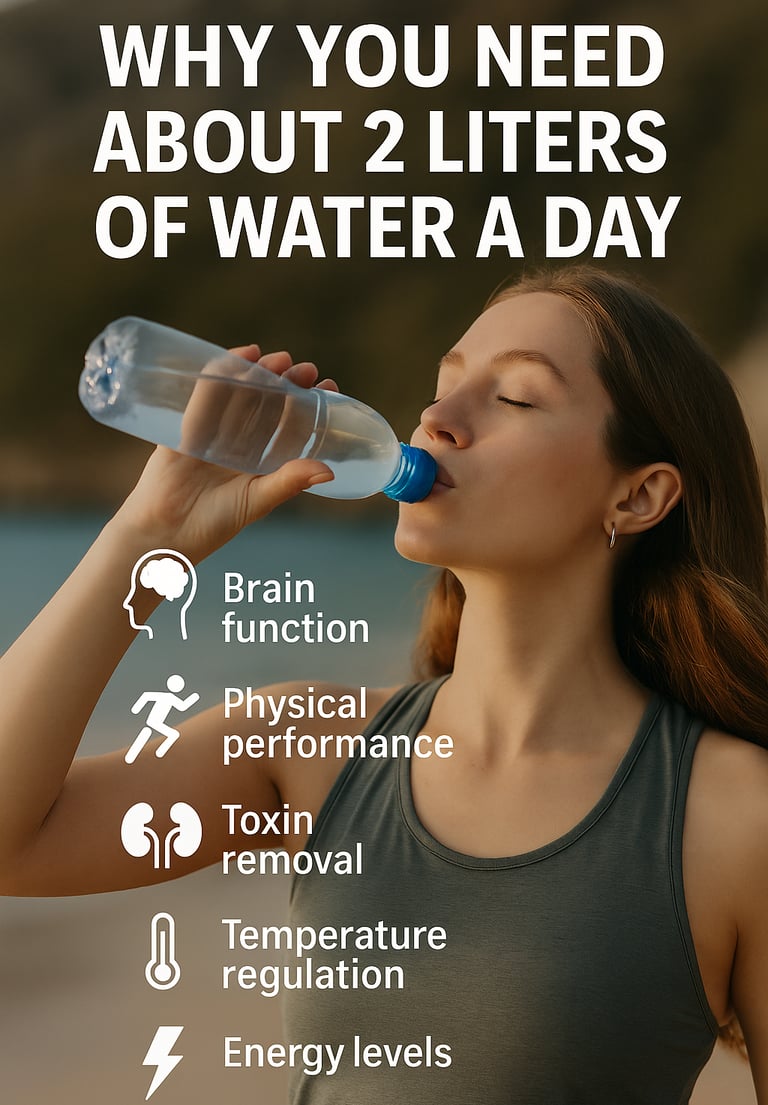What Are the Benefits of Proper Hydration?
Discover the benefits of staying properly hydrated: energy, digestion, skin health, brain function, heart support, and performance. Learn how much water to drink daily to stay healthy.
HEALTHBLOG-LIST
Narcisse Boss
8/23/20252 min read


In Brief
Water makes up about 60% of the human body and plays a vital role in nearly every function. Yet many people don’t drink enough each day. Proper hydration improves focus, supports digestion, optimizes circulation, and helps flush out toxins. It’s also essential for healthy skin, joints, and the heart. In this article, we’ll explore why hydration is a cornerstone of overall health and how it impacts daily life.
Table of Contents
Why Water Is Essential for the Body
Key Benefits of Proper Hydration
Energy and Focus
Digestion and Elimination
Skin Health
Heart and Circulation
Physical Performance
How Much Water Should You Drink Daily?
FAQ
Conclusion
Why Water Is Essential for the Body
Every single cell in your body needs water to function. It regulates body temperature, transports nutrients, and aids detoxification through the kidneys. Without enough fluids, the body tires quickly and efficiency decreases.
👉 Also read: 9 Drinks That Boost Your Gut Health.
Key Benefits of Proper Hydration
1. Energy and Focus
Even mild dehydration (just 1–2% of body weight) can reduce alertness, memory, and concentration. Drinking water regularly helps maintain mental clarity and productivity.
2. Digestion and Elimination
Water helps break down nutrients, supports smooth digestion, and prevents constipation. It also assists the kidneys in filtering waste products effectively.
3. Skin Health
Well-hydrated skin is plumper, more radiant, and resilient. On the other hand, dehydration worsens dryness, fine lines, and dull complexion.
4. Heart and Circulation
Adequate hydration maintains blood volume, supports heart health, and may help prevent high blood pressure.
👉 Learn more: How to Prevent High Blood Pressure.
5. Physical Performance
During exercise, dehydration reduces endurance, increases fatigue, and may trigger cramps. Drinking water before, during, and after activity optimizes recovery and performance.
How Much Water Should You Drink Daily?
On average, adults should aim for 1.5 to 2 liters of water per day, or about 8 glasses. This amount varies depending on age, weight, climate, and activity level. Hydrating foods such as fruits, vegetables, and soups also contribute to daily fluid intake.
FAQ
1. Do coffee and tea count toward hydration?
Yes, but in excess they can have a mild diuretic effect.
2. Is sparkling water as effective as still water?
Yes, as long as it’s not too high in sodium.
3. How do I know if I’m well hydrated?
Urine color is a simple indicator: light = well hydrated, dark = need more fluids.
4. Can you drink too much water?
Yes, though it’s rare. Overhydration (hyponatremia) usually happens only in extreme cases.
5. Do children and older adults need more fluids?
They are more vulnerable to dehydration and should pay extra attention to their fluid intake.
Conclusion
Proper hydration is a pillar of overall health. It supports the brain, heart, digestion, skin, and physical performance. Yet many people underestimate how much water they really need.
💡 Action step: Keep a reusable bottle with you at all times and set a daily goal of 8 glasses of water.
Scientific Sources
Popkin BM, et al. Water, hydration, and health. Nutr Rev. 2010.
EFSA. Scientific opinion on dietary reference values for water. EFSA Journal. 2010.
WHO. Nutrition and hydration guidance. WHO, 2020.
Written by Narcisse Bosso, certified naturopath. His lifelong passion for health became a profound calling after a loved one passed away from a natural illness that could have been prevented with simple lifestyle changes and habits.
